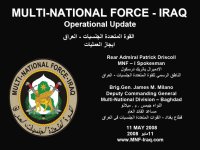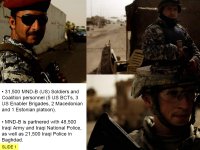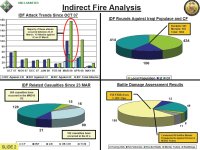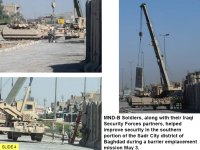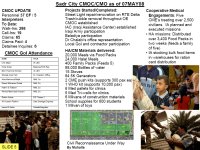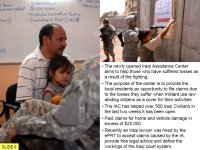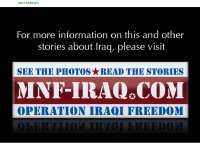
PRESS CONFERENCE: Operational Update: Brig. Gen. Milano, Rear Adm. Driscoll, May 11, 2008
Multi-National Force-Iraq
Sunday, 11 May 2008
Brig. Gen. James M. Milano, Deputy Commanding General, MND - B, and Rear Adm. Patrick Driscoll, spokesman for MNF - I, discuss security, reconstruction and economic development.
PRESS CONFERENCE:
Rear Admiral Patrick Driscoll, Spokesman, Multi-National Force – Iraq
Brigadier General James M. Milano, Deputy Commanding General of the 4th Infantry Division and Multi-National Division – Baghdad
DATE: May 11, 2008
TRANSCRIBED BY: SOS INTERNATIONAL LTD.
PARTICIPANTS:
Rear Admiral Patrick Driscoll
Brigadier General Mike Milano
REPORTERS:
Alexandra Zavis from The Los Angeles Times
Unidentified reporters from Al-Huriya TV, Nina Agency, Christian Science Monitor, and IVA Agency.
REPORTERS 1-18
*REP1 = REPORTER 1
RDML DRISCOLL: As-Salāmu `Alaykum and good afternoon. I am joined today by Brigadier General Mike Milano, Deputy Commander of Multi-National Force – Baghdad, and he will be giving you an update today. I’ll be talking a little bit about security and reconstruction to start with and then the general will be talking about operations in Baghdad. I’d like to start my remarks by commenting on some economic development. Because of the progress in security and increased capacity of the Government of Iraq, we are seeing some encouraging indicators of growth and economic recovery in Iraq from the macro and the micro level. While Iraq is blessed with tremendous natural resources, there are many challenges to fully capitalize on those resources, investing in them efficiently for future growth and facilitating the opportunities for all Iraqis to be part of a thriving economy. After nearly 30 years of dictatorship and centralized control, many Iraqis are working hard to rebuild a country where all Iraqis can have an opportunity to thrive and prosper. Last week the Government of Iraq signed an agreement for nearly $6 billion to purchase 50 passenger aircraft from Boeing and Bombardier. With the delivery of some of these aircraft scheduled to start this year, these purchases will help modernize the Iraqi air travel industry. More importantly, it will mark a significant step for the government as it invests in the country’s infrastructure. While the government is working on parameters on how best to use new revenues for the benefit of all Iraqis, Iraqi’s[sic] increased oil revenue that has been reinvested in Iraq will be used to strengthen the government’s ability to redevelop the country. The government has invested in emergency response funds and prioritized quick impact projects to accelerate redevelopment in areas victimized by criminals and terrorists. In Anbar, Diyala, and Tal Afar, the government has implemented programs to provide $120 million in housing compensation in three provinces. Provincial governors are processing claims for people to rebuilt homes destroyed by terrorism. Also, the government has allocated over $350 million in emergency funds for Basra, Baghdad, and Mosul to cover the immediate needs of residents and provide essential services for areas formerly subjected to criminal activity, intimidation, and neglect. The government is investing in long-term projects as well. One example is the recent announcement by the Ministry of Education that it will spend about $5 billion on educational projects. As Iraq is historically well known for its educational programs, the government is investing in education and educating the future generation that will be prepared to capitalize on the opportunities of a free Iraq. Beyond decentralized investments, the government announced at the end of March that it is allocating $5 billion of supplementary budget to add funds to the provincial budgets and to boost specific projects that will create jobs and stimulate local industries. One of these key programs has been the government’s commitment to $1.2 billion for an economic stimulus plan for small and medium businesses; 60% of these funds will be administered as small business loans through the Ministry of Labor and Social Affairs. And as the weeks…and as [of] this week, the ministry has approved over 25,000 loan applications. Forty percent of the $1.2 billion economic stimulus plan is designated to the Ministry of Industry and Minerals for medium-sized business expansion loans to registered companies. So far 4,500 applications have been submitted for loans ranging from $12,000 to $24,000. These loans will allow for businesses to expand their infrastructure, hire more employees, and support long-term development in economic industries. The individual effort of Iraqis is helping rebuild the economy. In past briefings we’ve highlighted the resurgence of fish farming, poultry, date palm industry, and wheat production. These are all example[s] of local residents seizing the opportunity of micro-loan programs to get local industries back on their feet. On 5 May, in the community of Mahmudiyah, south of Baghdad, representatives from four local women’s committees met to discuss how to continue developing grassroots economic programs and coordinate support. With the help of micro-grants, many of these women have set up sewing cooperatives where materials production and sales of sewing goods are done collectively. The co-ops are not only providing employment for women, but they are also providing profits to take care of broken families of widows and orphans affected by sectarian violence and terrorism. As these women are given the opportunity to help themselves, they are also helping others. Economic growth is still uneven and the institutional capacity of the various levels of government to assess economic requirements and efficiencies is still a work in progress. However, we are seeing that the government, the provincial governments, and the local communities as well as individuals are stepping up and seizing opportunities. Ultimately Iraqis will only be able to invest, develop business, get jobs, and rebuild their economy if the rule of law is enforced and people cease to profit by crime and violence. It is with that mission in mind that the coalition is supporting the Iraqi security forces in applying the rule of law evenly in Iraq. Despite the progress we’ve seen in Baghdad over the past 15 months, there are still areas of the capitol where people are still victims of violence. To discuss the ongoing effort to enforce the rule of law and rebuild people’s lives in Baghdad, I would like now to turn this over to General Mike Milano for his comments.
BRIG GEN MILANO: Good afternoon. As-Salāmu `Alaykum. I’m Brigadier General Mike Milano, Deputy Commanding General of the 4th Infantry Division and Multi-National Division – Baghdad. Thank you for this opportunity to be here today with Rear Admiral Driscoll to share what has been happening in our operating environment. Within Multi-National Division – Baghdad, 31,500 U.S. soldiers are operating in full partnership with 48,500 Iraqi Army soldiers and national police as well as with 21,500 Iraqi police. Together our primary mission is to protect the Iraqi people. Since we arrived in December we have seen a resilient Iraqi government and its security forces take significant steps forward in providing security, stability, and essential services for the people of Baghdad. While most of Baghdad and the surrounding areas have been relatively calm and continue to progress, development in Eastern Baghdad has been delayed due to hostile attacks by those operating outside the rule of law. As you know, since late March, enemy personnel have increased their attacks against the freely elected Government of Iraq, innocent civilians, their Iraqi security forces and U.S. soldiers using illegal weapons, mortars, rockets, small-arms fire, IEDs, and rocket-propelled grenades. Since March 23rd, these outlaws have fired over 1,000 rockets and mortars throughout Baghdad causing 269 casualties. And the majority of these attacks have come from Sadr City. These evildoers also attack with improvised explosive devices and most of them are explosive[ly]-formed penetrators which are the number one killer of our soldiers. In the past month and one-half, Iraqi security forces, with U.S. soldiers in support, have been conducting operations in Southwest Sadr City to safeguard Iraqi citizens from rocket and mortar attacks around Baghdad. We have had success against the rocket and mortar attacks in Sadr City and the areas controlled by the Iraqi Army and U.S. soldiers in the southern-third portion of Sadr City. To date, 57 rocket rails and mortars have been destroyed and 150 outlaws killed. But because the rocket firers, mortar teams, and IED emplacers continue to resist the rule of law guaranteed to all citizens by the Iraqi government, U.S. and Iraqi Army soldiers began emplacing barriers to protect the South Sadr City residents. Today we are about 80% complete with this part of the mission in the areas we refer to as Thawra 1 and Thawra 2. In other parts of Baghdad these proven measures have enabled the Iraqi security forces and Government of Iraq to restore stability and security to threatened communities by creating safe markets and safe neighborhoods. About three weeks ago we established a combined Civil-Military Operations Center with representatives from the Iraqi Army, Government of Iraq, and the brigade’s embedded provincial reconstruction team in the Thawra 1 Joint Security Station to provide a central access point for local citizens. We don’t see a humanitarian crisis. The markets in and around Sadr City are open. Government of Iraq representatives and local officials are identifying problems with sewer and water for repair. Trash is being cleaned up by local officials. Electrical transformer repair parts have been brought in by Ministry of Electricity teams to improve electricity. And a neighborhood watch program is being developed and is well received by the local Iraqis. The combined security efforts of Coalition forces and the Iraqi Army have made this possible. All of these measures are linked with the security provided by the Baghdad Operations Command. There is also a co-located Iraqi assistance center that functions to process claims, provide status on detained family members, provide immediate essential service needs, and respond to the needs of the citizens in Sadr City such as coordinating projects for trash and rubble removal, street repair, local lighting, micro-grants for small businesses, et cetera. With the Government of Iraq and Iraqi security forces in the lead, we remain committed to protecting the people of Baghdad from the criminals who threaten the long-term stability and security that each Iraqi law-abiding citizen deserves. Shukran. As-Salāmu `Alaykum. And Admiral Driscoll and I would be happy to take your questions now.
RDML DRISCOLL: Yes, sir.
REP1: [Asks question in Arabic.]
INT: Admiral Driscoll. Question to Admiral Driscoll. Several operations in Baghdad were conducted because there are several militias like JAM and other kinds of militias. Could you tell us why don’t you attack intense…strongly against a certain militia or those militias?
RDML DRISCOLL: I’m sorry. Could you repeat the last part of the question? Why don’t you attack who?
INT: I’m sorry. The mike’s not that clear. I couldn’t hear it.
REP1: [Repeats question in Arabic.]
INT: Why don’t you conduct large operations in other places in Baghdad just like you’re doing in Sadr City and detain the suspects?
RDML DRISCOLL: Do I take that one?
BRIG GEN MILANO: [Responds off microphone.]
RDML DRISCOLL: Okay. Thank you.
BRIG GEN MILANO: I think it’s important to remember why we are operating in Sadr City the way we are: that was where the rocket fire originally emanated from in March. And in support of the Iraqi security forces, we took action to eliminate that rocket fire which was threatening and killing the citizens of this city. That’s why we’re in Sadr City today operating the way we are.
RDML DRISCOLL: Sir.
REP2: [Asks question in Arabic.]
INT: Al Huriya TV. The Iraqi government said that the Sadr Trend made an agreement to stop the violence. As Multi-National Forces, what is your opinion about this agreement between the Sadr Trend and the Sadr…and the government? What is your comment about this agreement?
RDML DRISCOLL: Well, we welcome an end to violence and putting an end to the criminal activity so we are obviously in support of the Government of Iraq as they move forward in a dialog with elements of the Sadr Trend. The point here is to eliminate the criminal activity that is targeting innocent civilians in Baghdad and, you know, bringing misery and suffering and, unfortunately, casualties to those folks. Coalition forces are going to work in alignment with Iraqi security forces during this process and we are doing limited operations in Sadr City as this implementation process takes place.
REP3: Alexandra Zavis from The Los Angeles Times. Have you seen any signs yet of the truce that was announced yesterday in Sadr City actually taking an affect on the ground? And secondly, there was some confusion yesterday as to how the terms of this agreement would affect the operations of the Coalition forces and I was wondering what you’ve been told on this and how you interpret the deal.
RDML DRISCOLL: I’ll answer just the last part of the question. I’ll let the general answer the specifics and what he’s seen. Yesterday we did see a dialog and I think it is just important to emphasize that it is an ongoing dialog process and we’re waiting to see the details actually being worked out and implemented today through discussions with the Government of Iraq and those Sadr Trend elements. So we are taking…we support the Government of Iraq in this process, but we’re…I would say that it’s premature to say that there is an agreed to truce; I think the process of negotiations is ongoing.
BRIG GEN MILANO: Yes. And yesterday afternoon we did have a small-arms fire engagement in Sadr City in the area where we’re emplacing the barrier. And last night we engaged an IED emplacement team around midnight last night.
REP3: Anything this morning?
BRIG GEN MILANO: Not that I’m aware of activity-wise in or on site. But if you want to follow up with us afterwards or with my public affairs officer, we can answer that.
RDML DRISCOLL: Yes, sir.
REP4: [Asks question in Arabic.]
INT: Yesterday the spokesman for the Government of Iraq announced that there is an agreement between the Iraqi forces and the Sadr Trend and it includes 14 points. And how do you view this agreement which starts today?
RDML DRISCOLL: Right. I think if I understood the dialog yesterday was that the Government of Iraq is supporting a dialog. It’s ongoing today in terms of reaching agreement on the various parts of points that you describe. And I think that implementation process—the details are still being worked out today. And as I said, we would welcome any reduction in violence and that—obviously the benefit of that would be… the beneficiaries of that would be the innocent people in Baghdad in the stopping of the violence against them. Sir.
REP5: [Asks question in Arabic.]
INT: Were you…have you been told that…by the Iraqi government to stop the attacks against Sadr City during the agreement or during these negotiations? Did the Government of Iraq told you that to stop or ask to stop the attacks or operations in Sadr City due to the agreement?
RDML DRISCOLL: We’ve had a…obviously have been in communication with the Government of Iraq. We obviously work through the Baghdad Operations Center. It’s a joint effort in Baghdad. And as I said, we are limiting our operations just as the Iraqi security forces are. Sir.
REP6: As-Salāmu `Alaykum. [Asks question in Arabic.]
INT: Nina Agency. The conditions included that the American forces will not enter Sadr City and that their troops will not enter Sadr City. And will you commit to this agreement? Will the American forces commit to this point of not entering Sadr City?
RDML DRISCOLL: This is a process of negotiation between the Government of Iraq and elements of the Sadr Trend and so, you know, I’ll refer you to the Government of Iraq for how they are going to negotiate and make those decisions. Sir.
REP7: [Asks question in Arabic.]
INT: Are there any conditions or red signs that the American Army…that prevents the American Army from making the truce? Are there any red lines that the American Army or the security forces can’t cross?
RDML DRISCOLL: As I said earlier, the process of implementation is still being worked out between...and discussed between the Government of Iraq and those elements of the Sadr Trend. We are supporting and aligning ourselves with the Iraqi security forces and we’ll…we’re…like I said, I’ll refer you to the Government of Iraq for the details once those discussions are complete.
BRIG GEN MILANO: But I will tell you that Multi-National Division – Baghdad will continue to partner with the Iraqi security forces to protect the population and it will continue to work with the Government of Iraq to improve the provision of essential services.
RDML DRISCOLL: Yes, sir.
REP8: [Asks question in Arabic.]
INT: Have you found any weapons in Sadr City that carry or say that they were made in other neighboring countries or that bear signs that say that they were made in neighboring countries?
RDML DRISCOLL: Well, we’ve said all along that there’s been evidence of weapons we’ve found throughout – not only in the Baghdad area but down in Basra as well – that are manufactured in Iran. And that goes to the statement that we’ve made that we have evidence that there has been training of Iraqis in Iran, that there’s been financing of those networks that come back here and set up criminal gangs that perpetuate violence and intimidate and extort and often they use Iranian-made weapons. Sir. In the back.
REP9: [Asks question in Arabic.]
INT: I have…question to Admiral Driscoll. In case the government agreed with the Sadr Trend that…to prevent the coalition forces to enter Sadr City, will you commit to the government…to the decision made by the GOI? And also you’ve – the second question – said that you’re putting concrete barriers in Sadr City. Where exactly are you putting those concrete barriers? And also, could you give me some details about the number of the detainees from what you called the criminal gangs and how many of those criminal gangs have been killed or members?
RDML DRISCOLL: Once again, we’re working towards align[ing] ourselves with the Government of Iraq and we’ll wait to see what the details are as they continue this implementation process. And I’ll let the…
BRIG GEN MILANO: Regarding the barriers, we’re emplacing them along what we call Route Gold which is Quds Street and Jamila Street. And we’ve had a great deal of success over the past two years at emplacing barriers to create safe neighborhoods and safe markets. For example, in Saydiyah we’ve recently had the return of over 500 families who were displaced from that area because we were able to control access to that area using barriers and it’s now a safe neighborhood and we’ve had a great deal of families return. There is many…there are many markets in the city that have flourished because we’ve controlled access to them using barriers. So the intent of the barriers in Sadr City that we’re erecting are to control access, to consolidate the area that we’ve secured, and to prevent the reintroduction of criminal elements and weaponry that threaten the citizens of Baghdad.
RDML DRISCOLL: Sir.
REP10: [Unintelligible] with the Christian Science Monitor. Now, we understand that one of the measures in this agreement is that the forces of the Mahdi Army would be allowed to keep their weapons, but keep them…not display them, but to keep their weapons. But these are forces of a leader who has authorized them to resist coalition forces. So would this be an acceptable provision for the coalition forces, for the U.S. military?
RDML DRISCOLL: Once again, we’re…MNF-I’s in support…this is a Government of Iraq negotiation that’s still in process and we’ll have to wait to see the details. But it’s in process right now. There’s been, you know, no declarations in terms of what’s going to be implemented yet so we’ll have to wait and see. And I would refer you to the Government of Iraq to ask them – once it is – to answer that question.
REP11: Quick follow up. You said in response to one of my colleague’s questions that coalition forces are limiting…we are limiting our operations just as the Iraqi security forces are. Limiting how and how is this different from before?
RDML DRISCOLL: Well, as…we are aligning ourselves with the Iraqi security forces and following their lead. They have decided to take a pause here, if you will, in terms of some operations. As the general said though, we still will do operations in order to protect the innocent civilians, the citizens of Baghdad and those kinds of things.
REP11: Can you be a little more specific about what types of operations you are limiting?
RDML DRISCOLL: I’ll answer first and then let the general answer. But I’m not going to get into specific details just because it’s tactics, training, and procedures and it has to do with security as well.
BRIG GEN MILANO: And as you know, we’re not operating unilaterally in Sadr City; we are in support of the Iraqi security forces operating there. So, you know, we’ll follow their lead, if you will, as this develops over the next few days.
RDML DRISCOLL: Sir.
REP12: [Asks question in Arabic.]
INT: Admiral Driscoll. A few weeks ago a delegation from the Iraqi United Alliance went to Iran and met with some Iranian officials and they confirmed…those officials confirmed to the Iraqi delegation that Iran will commit in supporting the stability in Iraq and also will help Iraq in its unity. Don’t you think that Iranians kind of stopped supporting the militias or do you think…or they are still financing and training them?
RDML DRISCOLL: Well, I think that’s what…why the prime minister has set up this commission that is going to investigate it – what the influence…the negative influence of Iran here is in terms of weapons and providing training. And obviously it’s a very high-level committee that’s going to make the determination and then have a discussion with the Iraq…the Iranian leadership on that issue. So they are in the process of investigating that and they will make their own determinations and then have a dialog with the Iranians on the topic. And I think that it’s best to wait to see what their conclusions are. Ma’am.
REP13: As-Salāmu `Alaykum.
RDML DRISCOLL: As-Salāmu `Alaykum. ‘Alaykum Salaam.
REP13: [Asks question in Arabic.]
INT: You have mentioned that the security is stabilized in Sadr City. How would you describe the security situation in Sadr City? And while you’ve said that there are clashes until yesterday. So how would you say that it’s stabilized and there are clashes. The second question about the agreement between the Multi-National Forces and the government, we didn’t know about…did you know…could you tell us about the details about this agreement between the Multi-National Forces and the Iraqi government? And also, there was a question about the number of the detainees or outlaws from Sadr City. You haven’t answered this.
RDML DRISCOLL: I’ll just answer the overarching question about the agreement. The agreement is not between Multi-National Forces and anyone else. We’re here in support of the Iraqi security forces and the negotiation that’s going on right now is between the Government of Iraq and elements of the Sadr Trend. So that is the negotiation that’s going on and we are, as we said, we are supporting the Iraqi security forces.
BRIG GEN MILANO: Regarding the security situation in Sadr City, that area that we and the Iraqi security forces control, I would say the security situation is stable and getting better. We’ve had a significant increase in the Beladiya activity at repairing essential services: water, sewer, electricity, and so forth. We’ve had a significant amount of humanitarian assistance provided. We’ve had almost 600 walk-ins to our Iraqi Assistance Center which we established alongside the Civil-Military Operations Center. Regarding the exact number of detainees that we’ve detained since this began, I’ll have to have you follow up with us afterwards because I don’t have that exact number with me right now.
REP13: [Asks question in Arabic.]
INT: What about the number of the casualties that the Ministry of Health said. How would you comment about this…regarding this stability?
BRIG GEN MILANO: I don’t know what the number is that the minister of health said in terms of numbers of casualties. All I know is that there were 269 innocent civilians who were casualties as a result of the enemy’s indirect fire attacks since this all began toward the end of March.
RDML DRISCOLL: Sir. Yes.
REP14: [Unintelligible] vis-à-vis your forces are following the lead of the Iraqi security force in Sadr City. And are we to understand that there is now a pause in the military operations of the Iraqi security forces in Sadr City as we speak?
RDML DRISCOLL: I think to answer that is we are limiting our operations in reflection of what the Iraqi security forces will do. So we are supporting the Government of Iraq’s approach to the security in Sadr City as they continue this implementation process is[sic] the discussions that are going on right now. It’s, you know, we are supporting. We are, just like most people here, anxious to find out how the negotiations and discussions go. During that period we are in support of Iraqi security forces and will follow their lead in terms of their posture and their operations.
REP14: [Unintelligible] as we speak.
RDML DRISCOLL: Well, we did see yesterday—last night I think there was a decline in operations. Sir.
REP15: You said there are areas that are encircled by concrete walls in Baghdad and it’s successful. So how many of such areas are there? And the second question, you said about 1,000 or more mortars or rockets were hit and 300…about 300 civilians were killed. So these rockets were targeted in International Zone and they were miss-hitting or what is the purpose of hitting those rockets?
BRIG GEN MILANO: Well, there are numerous safe markets and safe neighborhoods that have been established in Baghdad over the last two years and I could…Ghazaliyah, Shorja Market, Doura Market, Saydiyah. I mean countless number…not countless but many areas where we’ve controlled access, been able to establish security, rid the area of criminal elements. And we’ve seen those areas flourish either in the form of displaced persons who have returned or markets, in terms of number of shops that have opened and commerce that’s taking place within those markets. So we have ample examples of where we’ve partnered with the Government of Iraq and established these safe markets and safe neighborhoods. And, yes, I did mention that there have been, to date, 1,000 rockets fired in and around Baghdad and the casualty number that I mentioned was, I believe, 269.
REP15: But what is the purpose of…what is their purpose? Who are they wanting…do they want to hit? Whom [do] they want to hit?
BRIG GEN MILANO: Well, as you know, many of those rockets were aimed at the International Zone here and elsewhere throughout this city. Heinous acts, indiscriminate killing of women and children and we have acted in support of the Iraqi security forces to put an end to that activity.
RDML DRISCOLL: And it’s basically…it’s violating the law. As the prime minister has said, you know, only the Iraqi security forces are allowed to carry weapons, heavy weapons. There is no need for the neighborhood to have 240 millimeter rockets, 107 millimeter rockets. They are violating the law and the prime minister says that’s, you know, it’s unacceptable. And in order for the citizens of Sadr City to enjoy the same increase in security that we’ve seen throughout the rest of Baghdad, that rule of law has got to be enforced. And so, as I said, this dialog that’s going on right now, hopefully, will be a political, a diplomatic solution, if you will, to the problem which obviously coalition forces are supporting. Sir.
REP16: [Asks question in Arabic.]
INT: Today we have an operation called Lion Roar in Mosul. Today, Operation Lion Roar started to…in Mosul. How do you think this will affect the security in Baghdad?
RDML DRISCOLL: Well, I think, first of all, Lion’s Roar is a new initiative. It’s an Iraqi-planned and Iraqi-led operation up there in Mosul to support what General Riyadh and the folks in the Ninawa Operations Center are involved with. As you know, the plan has been in oper-…in execution for some time and this is some additional forces and some additional leadership there to target al-Qaeda precisely. We’ve got the minister of interior is up there right now along with Major General Abdul Kareem, Ministry of Interior operations officer. And they are going there, once again, to bring some special capabilities and some additional forces to target al-Qaeda in the neighborhoods there. In terms of how it’s going to affect or change things in Baghdad, I don’t think it’s going to have an impact on the force structure or the security situation directly. Obviously anytime that we can weaken al-Qaeda in the country, everybody-…all the Iraqis benefit from that security. And I don’t…do you have anything to add?
BRIG GEN MILANO: No, we continue to take action against those who operate outside the rule of law to include al-Qaeda. We’ve been very active against them lately as well.
RDML DRISCOLL: Sir.
REP17: [Asks question in Arabic.]
INT: Admiral Driscoll, you know that the negotiations between the Iraqi government and the Sadr Trend is ongoing and that the…in case this agreement or this talks failed, are we going to see large operations in Sadr City? Will there be a bigger operation in Sadr City in case those…the negotiations failed?
RDML DRISCOLL: Well, once again, we are going to go and support the Government of Iraq approach to resolving the issue in Sadr City. Right now the Government of Iraq is negotiating and having discussions and try[ing] to come to an agreement how to peacefully transition in order to establish law and order. We will, once again, if that situation doesn’t work out, we will continue to support the Government of Iraq in their efforts whatever they may be. I think we’ve got time for one more question and then we’re going to have to go. Sir. In the back.
REP18: [Asks question in Arabic.]
INT: IVA Agency. There are some media reports saying or made by Iraqi officials saying that some of the sectors in Sadr City will be evacuated. Is there an intention to launch a large operation on those sectors that are being evacuated now?
BRIG GEN MILANO: We know of no intentions to evacuate large numbers of citizens. As you know, the Government of Iraq has conducted what we would consider to be, excuse me, prudent planning in the event there was some sort of catastrophic event that resulted in a large evacuation of personnel and we welcome that. We think it’s an excellent step in their regard. But we know of no directives to evacuate large numbers of personnel from Sadr City.
RDML DRISCOLL: Thank you very much for coming and we’ll see you next time.
|
NEWSLETTER
|
| Join the GlobalSecurity.org mailing list |
|
|
|


